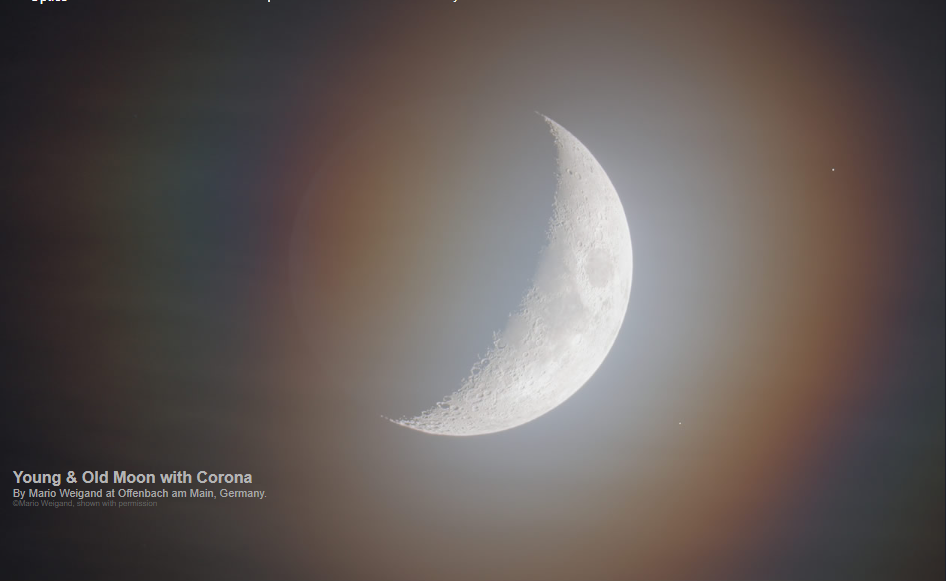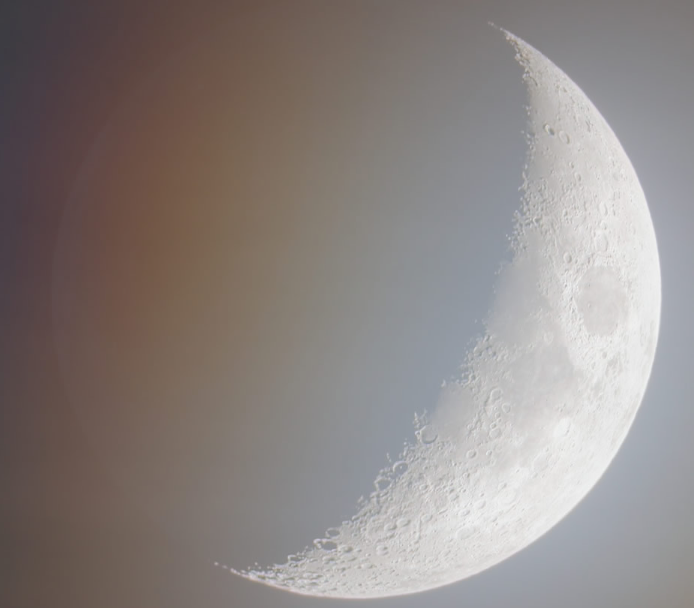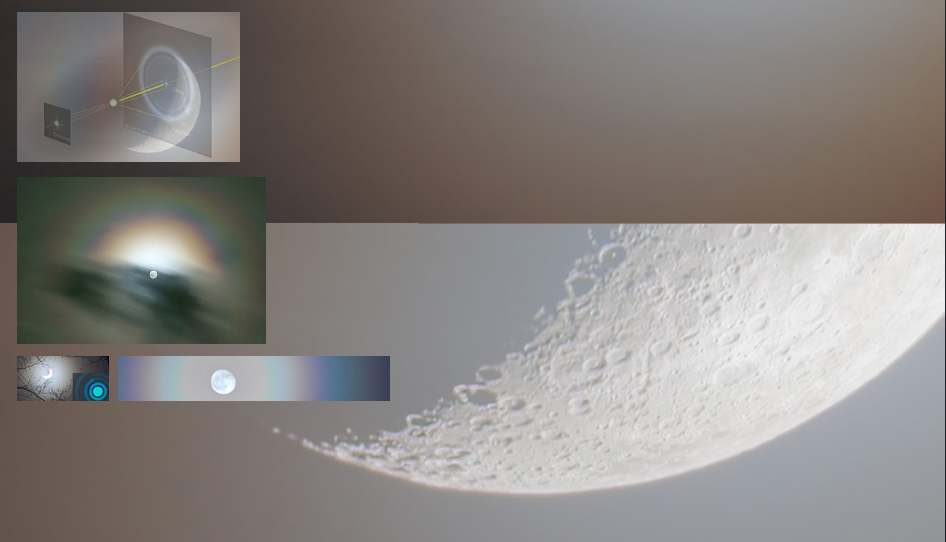OPOD - Crescent Corona
OPOD - Crescent Corona: A Spectacular Phenomenon
The captivating atmospheric optics phenomenon known as the "Crescent Corona" has been beautifully captured by Mario Weigand in Offenbach am Main, Germany. This stunning image showcases both a young and old moon, each exhibiting their unique characteristics when it comes to generating a corona. Let's dive into the details of this mesmerizing spectacle and explore the science behind it.
The Delicate Colors of the Crescent Corona
As we observe the crescent moon, we can witness a corona that deviates from the typical circular shape. The young moon's crescent produces a corona that appears less than perfectly round. On the other hand, the old moon emits a faint glow, reflecting the waning gibbous Earth's light upon its rocky surface.
The Gradation of Coronary Colors
When we examine the corona, we notice a progression of colors radiating outward from the central aureole. This color gradient begins with blues and transitions through yellows and straws before reaching red hues. Moving inward, we encounter the first ring, which presents an array of blue and violet shades that gradually shift to blues, greens, and reds once again.
The Subtle Hues of Diffracted Light
Unlike the spectral colors observed in rainbows created through refraction, the colors of the corona are more delicate. These hues originate from the diffraction of light by minuscule droplets present in the clouds. This intricate interplay between light and droplets results in the ethereal display of colors within the corona.
Mario Weigand's HDR Composite
Mario Weigand skillfully captured the visual essence of the lunar corona in his high dynamic range (HDR) composite image. By blending multiple exposures, Weigand was able to accurately depict the corona's intricate details. His composite image was created using exposures of varying durations, ranging from 2.5 seconds to a mere 0.005 seconds. The equipment used for this exceptional photograph included a TEC Apo 160/1280 ED telescope and a Canon EOS 5D Mk II camera.
Unveiling the Original Article
Please note that this article has been automatically converted from the old website and may not appear as intended. For the original article, you can visit the following link: Original Article.
Conclusion
The "Crescent Corona" is a captivating atmospheric optics phenomenon that showcases the unique characteristics of both young and old moons. Through the delicate gradation of colors and the diffraction of light by minuscule droplets, this phenomenon creates a breathtaking display in the night sky. Mario Weigand's HDR composite image beautifully captures the visual essence of the lunar corona, allowing us to appreciate its ethereal beauty.

Young & Old Moon with Corona
By Mario Weigand at Offenbach am Main, Germany.
©Mario Weigand, shown with permission

The young moon’s crescent generates a less than circular corona while the old moon glows faintly, returning the light of the waning gibbous Earth shining on its rocks.
We see the progression of coronal colours outwards from the central aureole. Blue grading through yellows, straws to red. Then the first ring, blue/violet inwards to blues, greens and reds once again.
Not spectral colours nor the mixed ones of refraction rainbows but the more delicate hues of light diffracted from the cloud’s miniscule droplets.
Mario's HDR composite perfectly records the lunar corona's visual appearance. Exposures of 2.5, 1.3, 1.0, 0,4, 0.2 and 0.005s: TEC Apo 160/1280 ED with Canon EOS 5D Mk II.

Note: this article has been automatically converted from the old site and may not appear as intended. You can find the original article here.
Reference Atmospheric Optics
If you use any of the definitions, information, or data presented on Atmospheric Optics, please copy the link or reference below to properly credit us as the reference source. Thank you!
-
<a href="https://atoptics.co.uk/blog/opod-crescent-corona/">OPOD - Crescent Corona</a>
-
"OPOD - Crescent Corona". Atmospheric Optics. Accessed on November 26, 2024. https://atoptics.co.uk/blog/opod-crescent-corona/.
-
"OPOD - Crescent Corona". Atmospheric Optics, https://atoptics.co.uk/blog/opod-crescent-corona/. Accessed 26 November, 2024
-
OPOD - Crescent Corona. Atmospheric Optics. Retrieved from https://atoptics.co.uk/blog/opod-crescent-corona/.